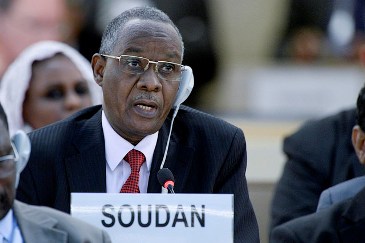Sudan claims UNHRC withdrew appointment of new independent expert
September 27, 2014 (KHARTOUM) – Sudan’s justice minister, Mohamed Bushara Dousa, said that Khartoum objected to the appointment of a new independent expert by the United Nations Human Rights Council (UNHRC) this week on the grounds that it wasn’t consulted first.

Mashood Badrain, who is the current independent expert, agreed to continue working until a consensus is a reached on his successor.
The justice minister said that Sudan asked for extending Badrain’s term, describing his tenure as “good” while a search is underway for a new one.
He said that UNHRC requested written approval from Badrain, adding that Sudan is waiting for it in writing after receiving it verbally.
This week Dousa called on UNHRC to end the mandate of the independent expert and rejected accusations made by NGO’s and Western countries of committing serious violations of freedoms and human rights, particularly in conflict areas of Darfur, South Kordofan and Blue Nile.
“What is the use of the mandate imposed under article 10? Isn’t it fair to end the mandate and let Sudan like other states apply its laws?” he said.
He further rejected accusations by the independent expert that Khartoum was dragging its feet in investigating the September 2013 protests and pointed out that the government has submitted to him a detailed report on measures undertaken with respect to those events.
The UNHRC, in a draft resolution presented by Ethiopia on behalf of the group of African states on Friday, expressed grave concern at excessive use of force, including the lethal shooting of demonstrators in September 2013 and March 2014, calling on the Sudanese government to launch an independent public inquiry and to refer its findings to the judiciary to ensure justice and accountability related to those incidents.
It also expressed concern “at reports of restrictions on the media, pre- and post-publication censorship, seizure of newspapers, the banning of some journalists and violations of the rights to freedom of expression and freedom of association and of peaceful assembly”.
The UN body urged the Sudanese government to further its efforts for the promotion and protection of human rights, in particular to ensure freedom from arbitrary arrest and detention, and to respect the human rights of all individuals, including human rights defenders and members of civil society organisations.
It condemned “the violations and abuses of international human rights and humanitarian law reported in the States of Darfur, South Kordofan and Blue Nile and by all parties, including sexual and gender-based violence, the indiscriminate bombings of humanitarian facilities, such as the reported aerial bombing of a hospital run by Doctors Without Borders, and the targeting of civilians and humanitarian aid workers, and urges all parties to resort to peace”.
The UNHRC further demanded that the Sudanese government investigate claims about human rights abuses in Internally Displaced Persons (IDP) camps, encouraging all parties to allow access for vaccination to conflict-affected areas and to facilitate humanitarian access to the needy populations.
It also urged the Sudanese government to intensify its efforts to address humanitarian needs in conflict-affected areas.
It also decided to renew the mandate of the independent expert on the situation of human rights in the Sudan for a period of one year under agenda item 10, to continue his engagement with the Sudanese government to assess, verify and report on the situation of human rights.
(ST)

